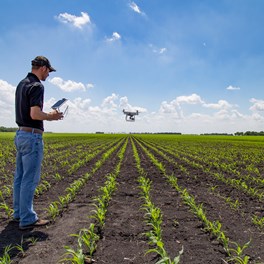Agrijobs Blog

AI in Agriculture
POSTED BY ANONYMOUS
Monday, June 5, 2023
Artificial Intelligence (AI) and the Benefits for Agriculture
Artificial intelligence (AI) is rapidly transforming the agricultural industry. From precision farming to smart irrigation, AI is helping farmers to produce more food, while using fewer resources.
Here are some of the benefits of AI in agriculture:
- Increased crop yields: AI can help farmers to improve crop yields by identifying and addressing problems early on. For example, AI can be used to detect pests and diseases before they cause significant damage to crops.
- Reduced input costs: AI can help farmers to reduce their input costs by optimizing the use of water, fertilizer, and pesticides. For example, AI can be used to determine the optimal amount of water to use for irrigation, or the best type of fertilizer to use for a particular crop.
- Improved food quality: AI can help farmers to improve the quality of their food by ensuring that crops are grown in optimal conditions. For example, AI can be used to monitor the temperature and humidity of greenhouses, or the nutrient levels in soil.
- Sustainable agriculture: AI can help farmers to adopt more sustainable practices by reducing their reliance on pesticides and herbicides. For example, AI can be used to develop new methods of pest control that are less harmful to the environment.
AI is still a relatively new technology in agriculture, but it has the potential to revolutionize the industry. As AI continues to develop, it is likely that we will see even more benefits for farmers and consumers alike.
Here are some specific examples of how AI is being used in agriculture today:
- Precision farming: Precision farming uses AI to collect and analyze data about soil, crops, and weather conditions. This data can then be used to make decisions about things like irrigation, fertilization, and pest control. Precision farming can help farmers to increase yields, reduce input costs, and improve the quality of their crops.
- Smart irrigation: Smart irrigation systems use sensors to monitor soil moisture levels and weather conditions. This data is then used to determine the optimal amount of water to use for irrigation. Smart irrigation systems can help farmers to save water, reduce their input costs, and improve the efficiency of their irrigation practices.
- Drone-based crop monitoring: Drones can be used to collect data about crops, such as their growth, health, and nutrient levels. This data can then be used to make decisions about things like fertilization, pest control, and harvest timing. Drone-based crop monitoring can help farmers to increase yields, reduce input costs, and improve the quality of their crops.
These are just a few examples of how AI is being used in agriculture today. As AI continues to develop, we can expect to see even more innovative applications of this technology in the future.
There will be many career opportunites aligned with the increased use of the technology.
BackTAGS
- JOB SEARCH TIPS
- AGENCY RECRUITMENT
- RESUME
- HELP FINDING A JOB
- FEEDBACK
- REFERENCE CHECKS
- CANDIDATE PRIVACY
- Wage Review
- Appraisals
- Job Benefits
- Salary Package
- Agriculture
- Non Agricultural Candidates
- Employment Contracts
- Fair Work Commission
- Human Rights Commission
- Workcover Authority
- Job Search Candidate Priorities

 TWITTER
TWITTER FACEBOOK
FACEBOOK LINKEDIN
LINKEDIN SUBSCRIBE
SUBSCRIBE